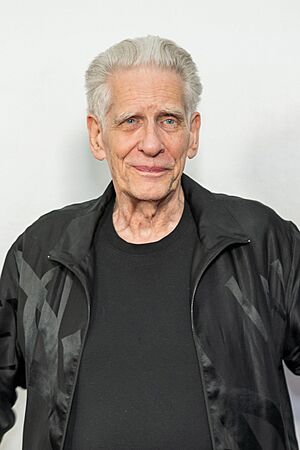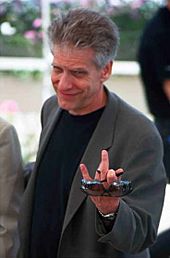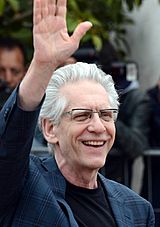David Cronenberg facts for kids
Quick facts for kids
David Cronenberg
CC OOnt
|
|
|---|---|

Cronenberg in 2025
|
|
| Born |
David Paul Cronenberg
March 15, 1943 |
| Education | University of Toronto (BA) |
| Occupation |
|
| Years active | 1966–present |
| Spouse(s) |
Margaret Hindson
(m. 1972; div. 1979)Carolyn Zeifman
(m. 1979; died 2017) |
| Children | 3, including Brandon and Caitlin |
| Relatives | Denise Cronenberg (sister) Aaron Woodley (nephew) |
David Paul Cronenberg (born March 15, 1943) is a Canadian film director, screenwriter, and actor. He is famous for creating a movie style called "body horror." His films often explore how technology and science can cause strange and startling changes to the human body.
Cronenberg is best known for his science fiction and horror movies. Some of his most famous films include Shivers (1975), Scanners (1981), Videodrome (1983), and The Fly (1986). He has also directed dramas and thrillers. His movies often make people think and have started many discussions. One critic called him "the most audacious and challenging narrative director in the English-speaking world."
His films have won many awards. For his 1996 film Crash, he won a Special Jury Prize at the Cannes Film Festival. This was a unique award given for the film's originality and daring style. In recent years, Cronenberg has often worked with actor Viggo Mortensen on films like A History of Violence (2005) and Eastern Promises (2007).
Contents
Early Life and Influences
David Cronenberg was born in Toronto, Ontario, on March 15, 1943. His mother, Esther, was a musician, and his father, Milton, was a writer and editor. He grew up in a home filled with books. As a child, he loved reading science fiction magazines and comic books. His favorites included Superman and Captain Marvel.
Cronenberg was also influenced by many different kinds of movies. He enjoyed watching experimental films, horror movies, and science fiction films. He said that some Disney cartoons like Bambi and Dumbo were "terrifying" to him as a child. He called Bambi the "first important film" he ever saw because of the powerful emotions it created. This feeling influenced how he later made his own horror films.
He attended the University of Toronto, first studying science before switching to English. After seeing a film made by a classmate, he became interested in filmmaking. He learned how to make movies by renting camera equipment and teaching himself.
Filmmaking Career
Early Movies
Cronenberg began his career making short films. In the 1970s, the Canadian government helped fund his movies. During this time, he directed films that established his unique "body horror" style, such as Shivers (1975) and Rabid (1977). His next horror film, The Brood (1979), received even more support from film companies. He also directed Fast Company (1979), a movie about his interest in car racing.
Breakthrough and Success

In the 1980s, Cronenberg became a major director. His 1981 film Scanners is about people with powerful mental abilities. It became a cult classic. He followed this with Videodrome (1983) and The Dead Zone (1983), which was based on a novel by Stephen King.
His biggest hit of the decade was The Fly (1986), starring Jeff Goldblum. The movie is about a scientist who slowly transforms into a giant fly after an experiment goes wrong. It was a huge success at the box office.
Cronenberg has mostly worked on his own projects instead of big Hollywood movies. He was once considered by George Lucas to direct Return of the Jedi but turned it down. He has worked with many of the same people on his films for years. Composer Howard Shore has created the music for almost all of his movies since 1979.
Later Films
In the 1990s, Cronenberg continued to make challenging films. He directed an adaptation of the book ... Lunch (1991). The book was considered impossible to film, so Cronenberg created a story that mixed reality with the main character's strange visions.
Cronenberg has also acted in movies made by other directors. He usually has small roles, called cameo appearances, but sometimes plays larger parts. He even had a small role as a doctor in his own film, The Fly.
His later films, such as A History of Violence (2005) and Eastern Promises (2007), were very popular with critics. Even though he has worked with Hollywood stars, he has filmed most of his movies in his home province of Ontario, Canada.

In 2012, his film Cosmopolis was shown at the 2012 Cannes Film Festival. He followed that with Maps to the Stars (2014), which was the first time he filmed in the United States. In 2022, he returned to his body horror style with the film Crimes of the Future. His most recent film, The Shrouds, premiered in 2024.
Personal Life
Cronenberg lives in Toronto. He was married twice. He and his first wife, Margaret Hindson, had one daughter, Cassandra. His second wife was Carolyn Zeifman, a film editor he met on the set of Rabid. They were married from 1979 until she passed away in 2017. They had two children, Caitlin and Brandon, who are also filmmakers.
Cronenberg has said that he is an atheist, which means he does not believe in a god. He has explained that he is interested in exploring life's big questions without religion. He says, "We are all going to die, that is the end of all consciousness. There is no afterlife. There is no God. Now what do we do.' That's the point where it starts getting interesting to me."
Awards and Recognition
Cronenberg is considered one of the greatest directors in science fiction and horror. He has appeared on many "Greatest Director" lists. In 2004, The Guardian newspaper listed him as one of the world's 40 best directors.
- In 1996, he won the Special Jury Prize at the Cannes Film Festival for Crash.
- In 1999, he was added to Canada's Walk of Fame.
- In 2002, he was made an Officer of the Order of Canada, and was promoted to Companion, the highest rank, in 2014.
- In 2006, he received a lifetime achievement award at the Cannes Film Festival.
- In 2018, he received the honorary Golden Lion at the Venice Film Festival.
Filmography
| Year | Title | Distribution |
|---|---|---|
| 1969 | Stereo | Film Canada Presentations |
| 1970 | Crimes of the Future | New Cinema Enterprises |
| 1975 | Shivers | Cinépix Film Properties |
| 1977 | Rabid | Cinépix Film Properties / New World Pictures |
| 1979 | Fast Company | Admit One Presentations / Danton Films |
| The Brood | New World Pictures | |
| 1981 | Scanners | New World Pictures / Manson International |
| 1983 | Videodrome | Universal Pictures |
| The Dead Zone | Paramount Pictures | |
| 1986 | The Fly | 20th Century Fox |
| 1988 | Dead Ringers | |
| 1991 | ... Lunch | |
| 1993 | M. Butterfly | Warner Bros. |
| 1996 | Crash | Alliance Communications |
| 1999 | eXistenZ | Alliance Atlantis |
| 2002 | Spider | Cineplex Films |
| 2005 | A History of Violence | New Line Cinema |
| 2007 | Eastern Promises | Focus Features |
| 2011 | A Dangerous Method | Sony Pictures Classics |
| 2012 | Cosmopolis | Entertainment One |
| 2014 | Maps to the Stars | Focus World |
| 2022 | Crimes of the Future | Sphere Films |
| 2024 | The Shrouds |
See also
 In Spanish: David Cronenberg para niños
In Spanish: David Cronenberg para niños
 | Jessica Watkins |
 | Robert Henry Lawrence Jr. |
 | Mae Jemison |
 | Sian Proctor |
 | Guion Bluford |

